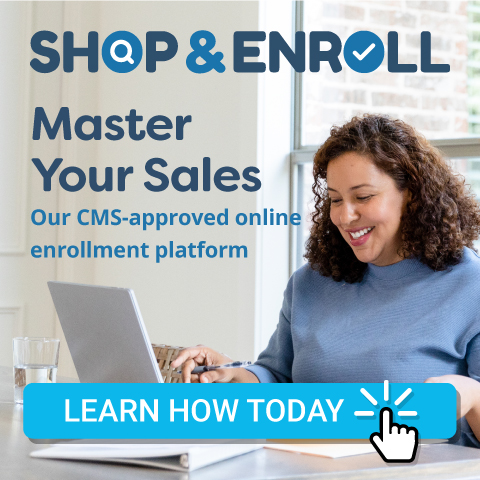You’re working a booth at a community event, and a person approaches you. She mentions those infamous and flashy Medicare commercials on TV. She wants help but isn’t comfortable calling a random number…
Here’s an opportunity for you to differentiate yourself from call centers. Although they serve a purpose, you, as a field agent, can offer unique opportunities to your clients that call center agents can’t, namely time and flexibility, long-term relationships, in-person meetings, a diverse portfolio, and education. Here are six ways to show your true colors.
Set the Tone at First Contact
Whenever a potential client calls or approaches you, they may not know much about you. Perhaps they searched “insurance agent near me” online, saw one of your ads in the local paper, or approached you at an event like in the scenario above. Likely they aren’t even aware that the classifications of field and call center agents even exist.
When someone asks to hear a little more about you (or after you ask if they’d like to learn more), differentiate yourself immediately from a call center by setting the tone. This doesn’t mean you even have to mention call centers; it’s more about saying who you are than who you aren’t, although you could mention call centers if it makes sense, like in response to the scenario at the booth. (“I understand; that random number they’re advertising is for a call center. I work a little differently…“)
Start any conversation by emphasizing your role and presence in the community and communicating what services you offer. Some points you could mention include:
- Being locally based and an active part of the community (give some examples)
- Where your office is located
- Other agents or staff working with or for you
- Generally what products you sell (Medicare Supplements, Medicare Advantage, ACA, ancillary, etc.)
Cultivate Long-Term Relationships
Possibilities to build real relationships with your clients is one of the key differences between you and a call center agent. When speaking with a potential client, stress how much value you can bring them for the long haul — that you can be their agent, not just an agent.
For example, consider mentioning any of these that apply:
That you…
- Conduct annual reviews
- Are available to answer any questions
- Can schedule evening or weekend appointments
- Offer products for different stages of life
- Educate clients on the yearly rhythm of insurance (e.g., the Annual Enrollment Period, Special Enrollment Periods)
- Guide them through each step of the process, especially Scope of Appointment (SOA) completion and easy online enrollments
Outside of conversations with your potential clients, make sure you’re following through on your promises of a relationship. Sometimes, it can be the little things that really show your clients that you care about them. Here are some ideas for fostering long-term relationships:
- Sending birthday and thank you cards
- Call or send an email to check in a month after a client enrolls in a policy
- Conduct annual reviews
- Provide regular education in large or small groups
- Send email or hard-copy newsletters
While the relationship begins and ends with the sale for a call center agent, you have the opportunity for longevity.
While the relationship begins and ends with the sale for a call center agent, you have the opportunity for longevity. Capitalize on this benefit and foster your time together with thoughtful practices and consistent communication.
Offer In-Person Meetings
Although we could lump this in with the above description on how to set the tone, it’s too important not to delve into this unique feature more. Meeting in person with clients, at their home or at your office, is probably the key difference between you and a call center agent. Whenever you speak with a potential client, mention the advantages of meeting in person and ask if they’d like to schedule an appointment.
If your schedule allows, stress the flexibility of your time — something that call center agents who work predictable day-job hours can’t always do. Additionally, mention the length of an initial meeting and any value-added bonuses, like general Medicare education, a welcome packet of info, etc. Call center agents are more bound by the clock, so promote your availability to educate and answer questions. The resource of your time is often very valuable to clients, so attempt to maintain open and consistent channels of communication. Time and availability are what help transform you from an agent to their agent.
Call center agents are more bound by the clock, so promote your availability to educate and answer questions.
Promote Your Diverse Portfolio
A benefit of being an independent field agent is being able to offer your clients not only multiple carriers for the same types of products, but also ancillary products that complement their primary health coverage. With the luxury of more time and flexibility, you’re able to really get to know your clients and their needs and recommend the most comprehensive coverage that still fits their budget. Call center agents generally sell only one type of product (like MA plans), and in the case of captive agents, only one type of carrier. Highlighting your diverse portfolio makes you stand out. You’re a one-stop shop!
Remember, whenever you speak with a potential client, aim to educate, not pressure. If a lead feels like you’re trying to upsell them a lot of products from the beginning, they might avoid pursuing a relationship with you any further. Instead, mention that you offer multiple carriers and ancillary products during first contact and leave carrier specifics and ancillary details until their first initial Medicare appointment or follow-up appointments.
You can address dental, vision, and hearing and hospital indemnity products at that first initial Medicare appointment, as long as you have all the appropriate boxes checked on the Scope of Appointment.
Learn how to bulk up your portfolio with our free eBook, A Quick Guide to Cross-Selling Ancillary Insurance with Medicare Products!

Provide Education & Ensure Understanding
Whether formally in an event or class setting or informally during an appointment, teaching your clients differentiates you in a big way from a call center agent. Yes, call center agents will be able to educate callers on the products they sell, but the call center system isn’t set up for prolonged interaction, in-depth conversation, or addressing general questions about Medicare.
Take the time to delve deep with your clients on all topics Medicare; many Americans about to turn 65 don’t understand the many moving parts or even the basics of how to enroll in Parts A and B. Ask questions of your clients as well to ensure they understand your explanations. For example, after giving information ask, “Does that makes sense?” or “Do you need me to explain it a different way?”
Send Supplemental Info for Phone Appointments
If you schedule a phone appointment with a potential client, you have the chance to personalize the experience in a way that call center agents can’t. As a field agent, you can email or mail supplemental material to your client before a phone appointment. This information can be a great visual aid to your client as you explain and walk them through plan details and timelines.
If you schedule a phone appointment with a potential client, you have the chance to personalize the experience in a way that call center agents can’t.
Some information you could include:
- Welcome letter
- Meeting agenda
- Paper SOA or instructions on how to complete it online (if you use a CMS-compliant online enrollment platform)
- Chart comparisons of different plan types (e.g., Medicare Advantage vs. Medicare Supplement, PPO vs. HMO, Med Supp plan types, etc.)
- Plan details you will present during the appointment
- Ancillary product brochures
- Paper application or instructions on how to apply online (which you can do together over the call)
- A picture and short bio of you and other agents/staff members
- T65 information about enrolling in Medicare Parts A and B
Your aim is to personalize the phone experience and make it easier for your client to follow what can seem like a flood of information. If you send supplemental material, make sure you keep track or a copy of what you’ve sent and create a clear plan of how you’ll walk through or mention each piece during your appointment. You don’t want to be caught scrambling to remember what you included when your client asks, “What about this brochure on final expense?”
Keep It Positive
It might be tempting to throw call centers under the bus to make the unique benefits you offer more attractive but doing so might not come across the way you intend. Avoid saying things like, “Well, we’re not like those call centers who don’t care about you and just want to make the sale.” You never know who your potential client is or their experiences; maybe they’ve used a call center in the past and had a good experience. Maybe their niece works as a call center agent. You want to set a positive tone and atmosphere for your business, not introduce a negative energy that might permeate the rest of your time with the client, or worse, trickle out into the community at large and brand you a Negative Nancy.
Avoid critical comments and focus on all you can offer, instead. If a potential client asks questions about call centers, you can answer them honestly while still being equitable. What if it’s December 4, you work solo, and you have a family emergency that makes you cancel the rest of your AEP appointments? An email to your client with a plan recommendation and instructions to call a certain call center to get enrolled on time might be your best option. Remember, call centers serve a purpose.
When a potential client calls upon you, you want to make yourself stand out as their agent, ready to walk with them every step of the way. Promote your different services and flexibility, ability to meet in person, your diverse portfolio, educational opportunities, and interest in a long-term relationship.
Whether it’s helping you build up your portfolio, offering free CMS-compliant software, or providing numerous educational resources, Ritter Insurance Marketing is waiting to help you be a distinctive field agent. Register for free with us to unlock all our services and support.






Share Post